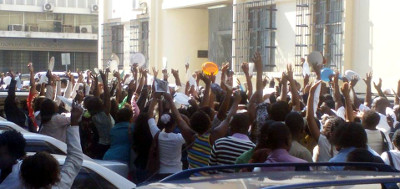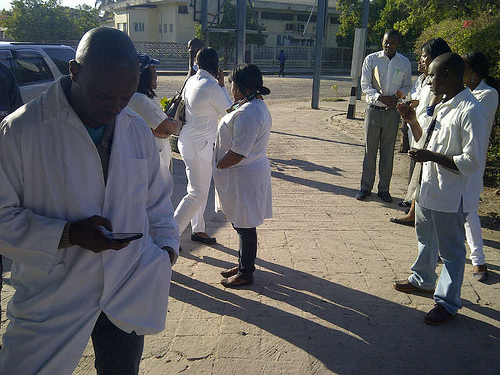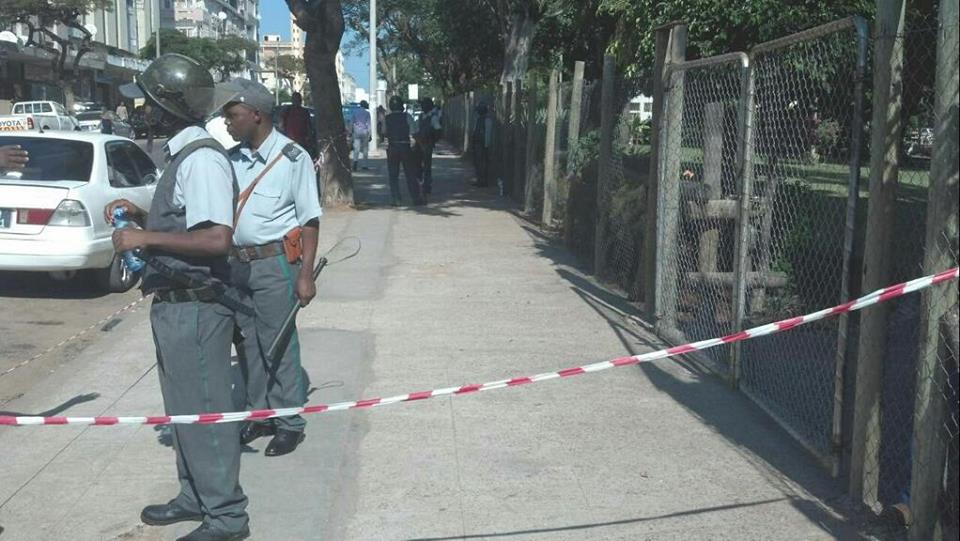Francisco J. P. Chuquela [1], a collaborator of Global Voices’ partner @Verdade Newspaper in Mozambique, reported this story for Global Voices
Health professionals in Mozambique have been on strike for ten days [2] leading to the halt of operations in many medical units throughout the country. The dispute with the government is based on demands for wage increase and standardisation, as well as the readjustment of the emergency room prices throughout the country's hospitals.
It is the second strike of the sector to take place in the country in 2013, only this time the protest of the doctors has expanded to more health professionals and has extended now for a second week.
Emotions peaked on Sunday night, May 26, 2013 when the President of Associação Médica de Moçambique [3], Dr. Jorge Arroz, was arrested [4] by police under accusation of sedition (incitement of discontent or rebellion against a government). The release of Arroz a few hours later was fueled by massive popular mobilisation in front of the police station combined with the presence of mainstream media and the intervention of jurists.
Tomás Queface, a student of sociology, summarised on his blog [5] [pt] Política e Tecnologia how Mozambicans immediately questioned on social media the reasons behind Arroz's detention and commented on the lack of freedom of expression in the country.
 [6]
[6]On Monday morning, May 27, health professionals met at the Cineteatro Gilberto Mendes, holding empty plates on their hands. Photo by Canal Moz.
Government's counter-information
Analysts believe that the arrest of Arroz has increased the participation [7] [pt] of health professionals in the strike. “Reports [8] on the percentage of participating strikers range from 90 to five percent of the medical workforce”, Aljazeera's The Stream reported on May 28.
 [9]
[9]On May 28, a citizen reported [10] that health professionals were meeting in Beira's Central Hospital.
Throughout the first week of the strike, as the spokesman of the Ministry of Health said that all health units had returned to normality, citizen and independent reporters stated that there were many restrictions in some of the major medical units.
Citizens and journalists in Maputo sent their reports from several hospitals and health unites: consultations were delayed, and patients were being received and screened by students, military doctors, foreigners and international organisations such as the Red Cross. Other professionals, who usually occupy positions of leadership outside the units, were performing more specialized services.
Acts of intimidation
Hospital directors tried to mobilize health professionals to work, but to no avail. An audio recording [11] [pt] shared [12] by the Medical Association of Mozambique on Facebook on May 21 revealed the Director of Mozambique's largest hospital threatening and intimidating healthcare professionals:
…no dia em que o Ministério da Saúde começar a usar toda a máquina que tem por trás, vocês vão chorar …
On May 22, the Police of the Republic of Mozambique (PRM) accompanied by the Rapid Intervention Force (FIR) forbid access to the Nangade garden, a public space in the capital of Mozambique, where health professionals intended to meet.
The strike goes on, what about health?
While the Ministry of Health remains unable to resolve the problem of doctors, nurses and servants, healthcare conditions are becoming more and more precarious.
In a liveblog created by @Verdade to gather citizen reports about the health sector strike, there are testimonies of lack of hygiene [14], medicines, and other basic needs. On the morning of May 28, a citizen reported [15] via SMS:
Numa reunião serviço esta manhã Hospital Central #Maputo [16] “nao ha roupa,comprensas,anestesico. Assim esta impossivel trabalhar.
Patients admitted with TB at the Mavalane General Hospital in the capital of the country have not received medication since the first day of the strike.
The Medical Association of Mozambique and the Commission of Health Professionals reiterated that the strike will only cease when the government stops intimidating health professionals and other staff who joined the cause, as well as when their demands are met. The health workers protest the way wage adjustments are being done, in violation of the memorandum [17] agreed between the association and the government in January.
The government, through the national director of strategic management of human resources in the Ministry of Public Function, said that they have already reached the capacity limit in terms of availability to the salary adjustment. The Ministry of Health accused the association of not being open to dialogue.
But @Verdade has copies of official correspondence exchanged between the association and the Ministry of Health where one can read, in a letter dated of May 21, that health professionals express their openness to the continuation of the negotiations, in response to a letter from the Ministry.
